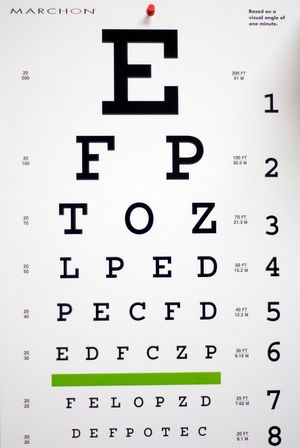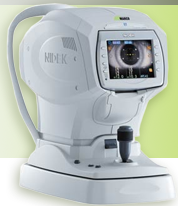
Comprehensive Eye Exams in New Boston, OH
Regardless of your age or physical health, it's important to have regular eye exams with your local eye doctors in New Boston, OH.
At New Boston Vision Center, we are committed to ensuring your vision is clear and your eyes are healthy. Our comprehensive eye exams are designed to assess your vision and overall eye health, offering a thorough evaluation for adults, children, and seniors.
What to Expect During Your Eye Exam
At New Boston Vision Center, we believe that understanding your eye health is a collaborative process. Our comprehensive eye exams are designed to be thorough, comfortable, and tailored to your needs.
Here’s what you can expect when you come in for your eye exam:
- Patient History Revie: We’ll begin by discussing your medical history, current vision concerns, and any symptoms you may be experiencing. This helps us get a clear picture of your overall health and any factors that might impact your eyes, such as diabetes or high blood pressure.
- Visual Acuity Test: Using a standard eye chart, we’ll measure how well you can see at different distances. This helps us determine if you need glasses or contact lenses to correct your vision.
- Refraction Test: During this test, you’ll look through a series of lenses to find the prescription that provides the clearest vision. This step ensures your eyeglass or contact lens prescription is as precise as possible.
- Eye Pressure Measurement: We’ll perform a quick and painless test to measure the pressure inside your eyes, a key factor in detecting glaucoma. This may involve a gentle puff of air or the use of a tonometer.
- Eye Health Evaluation: Using advanced technology such as digital retinal imaging or Optical Coherence Tomography (OCT), we’ll examine your retina, optic nerve, and other vital structures inside your eye. This allows us to detect early signs of eye conditions like glaucoma, cataracts, macular degeneration, and diabetic retinopathy.
- Pupil and Eye Muscle Testing: We’ll check how your pupils respond to light and assess the movement and coordination of your eye muscles. This helps identify any issues with focusing or eye alignment.
- Prescription Updates & Recommendations: Once your exam is complete, we’ll update your prescription for glasses or contact lenses, if necessary, and provide any recommendations for treatments or lifestyle adjustments to improve your eye health.
Signs You May Need an Eye Exam
Keeping your eyes healthy means staying aware of any changes in your vision or eye comfort. Here are some common signs that indicate it may be time to schedule an eye exam:
- Blurred Vision: Difficulty seeing clearly at any distance can be a sign of nearsightedness, farsightedness, or astigmatism. It may also point to more serious conditions like cataracts or macular degeneration.
- Frequent Headaches: Straining your eyes to see can lead to persistent headaches, often signaling the need for corrective lenses or a change in your prescription.
- Eye Strain or Fatigue: Prolonged use of digital screens, reading, or working in low light can cause eye strain and discomfort. This could indicate an underlying vision problem.
- Difficulty Seeing at Night: If you find it harder to drive or see clearly in low-light conditions, it may be a sign of cataracts or other vision issues.
- Double Vision: Seeing double can point to problems with eye alignment or neurological issues that need immediate attention.
- Flashes of Light or Floaters: While occasional floaters are normal, sudden flashes of light or a dramatic increase in floaters could signal a retinal issue that requires urgent care.
- Dry, Red, or Itchy Eyes: Persistent discomfort in your eyes can be a sign of dry eye syndrome or allergies, both of which can be managed with proper treatment.
If you notice any of these symptoms, it’s important to schedule an eye exam as soon as possible. Early detection of vision problems and eye diseases can prevent more serious complications down the road.
How Often Should You Test Your Eyes?
The frequency of eye exams depends on your age, health, and whether you wear corrective lenses. Regular check-ups are essential to maintaining clear vision and eye health.
Here’s a general guideline for how often you should schedule an eye exam:
- Children (Ages 0-18): First exam at six months old to ensure the eyes are developing correctly.
- Preschoolers: By age three, then again before starting school.
- School-aged children: Every 1-2 years unless a problem is detected.
Children with vision problems or a family history of eye conditions should have annual exams to monitor changes and address issues early.
- Adults (Ages 19-40): Even if you don’t wear glasses or contact lenses, you should have an eye exam every 1-2 years to catch early signs of eye diseases and monitor changes in vision.
If you wear corrective lenses, you should have an annual exam to ensure your prescription is up to date and your eyes are healthy.
- Adults (Ages 40-60): By age 40, your risk for developing age-related eye conditions such as presbyopia, cataracts, and glaucoma increases. Eye doctors recommend annual exams to screen for these conditions.
- Seniors (Ages 60+): Seniors are at higher risk for eye diseases like glaucoma, macular degeneration, and cataracts. Annual eye exams are crucial for early detection and treatment, which can preserve your vision and quality of life.
When to Schedule More Frequent Exams
Some individuals may need more frequent exams due to their health or lifestyle. If you have diabetes, high blood pressure, or a family history of eye diseases, or if you spend a lot of time using digital screens, you should consult your optometrist about more regular check-ups.
Don’t wait until a problem arises—schedule your routine eye exam to protect your vision and eye health for the long term.
Keep Your Eyes Healthy with Regular Eye Exams
Your eyes are one of your most important assets, and maintaining their health is key to preserving your vision. Don’t wait until vision problems arise. Regular eye exams are the best way to safeguard your sight and overall health. Schedule your appointment to stay proactive about your eye care.
Book your eye exam now and experience expert care in a friendly and welcoming environment. We’re here to help you keep your eyes healthy for life.




